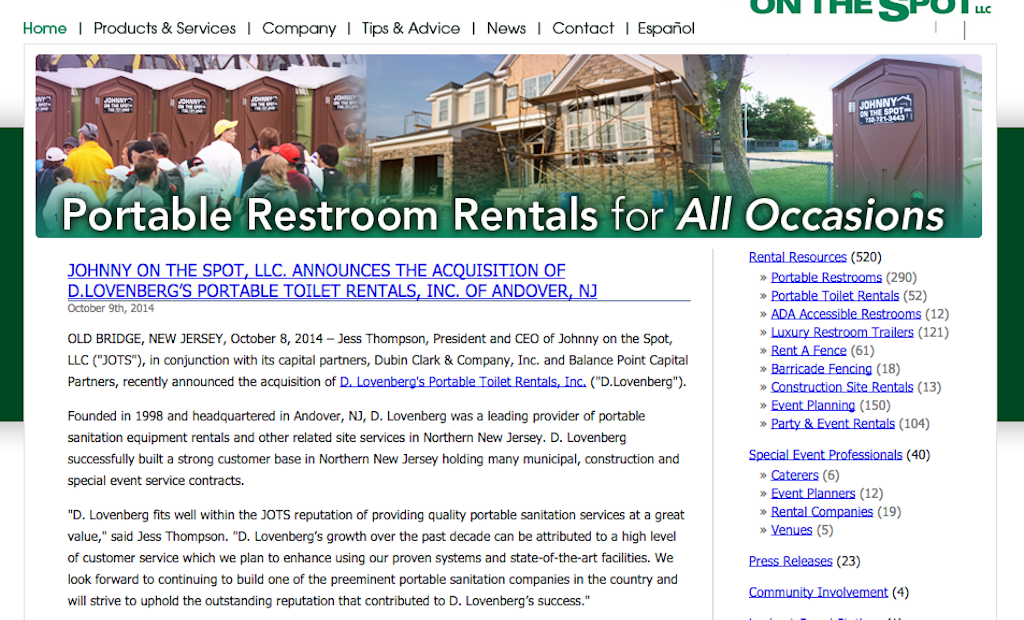
Interested in Onsite Systems?
Get Onsite Systems articles, news and videos right in your inbox! Sign up now.
Onsite Systems + Get AlertsBlogging is a bit like getting a new haircut. It might make you feel great about yourself, but what good is it if no one notices? The real benefits come when people start complimenting you, right?
While most septic and portable restroom companies in the 21st century have websites and at least some social media presence, not all have caught on to the benefits blogging can provide. Granted, it’s a busy industry, and many providers may not have the time or the staff members to devote to creating or updating a blog, but it can have its benefits, especially for smaller companies.
Marvin Hyer Jr. works in marketing and business development for Johnny on the Spot in New Jersey — the large septic and portable restroom firm services New Jersey, New York and Pennsylvania. He oversees the company’s blog, which launched in 2009.
Make the time
The company has worked on the blog in-house as well as outsourced content through agencies. He calls the content generated by an agency “a little bit more routine,” but admits that many practitioners don’t have the time or knowledge to both create and, more important, update a blog.
“If you have the time and the know-how to do it, it’s a good thing — if you can put together meaningful content,” Hyer says.
“You have to be dedicated to it; it’s one of those things that easily slips to the back burner.”
Johnny on the Spot’s blog is a conscious mix of business information (such as how to become a “preferred customer”), community involvement (celebrating World Portable Sanitation Day!), news updates (how Hurricane Sandy impacted the industry) and even politics (the portable restroom situation at a political campaign event) and trivia (a fascinating piece on a toilet exhibit in Japan). The blog is aimed at a variety of audiences, Hyer says, such as construction companies, special events firms and others looking for portable restrooms.
Johnny on the Spot also maintains a blog for the septic end of its business, aimed primarily at homeowners. “The blog offers a good opportunity to speak in layman’s terms,” he says.
Word to the wise
Hyer cautions that blogs should be updated often otherwise it reduces the credibility of the company if it isn’t updated.
Blogs, he says, should also not only be used as promotional vehicles. Content should be unique, educational or attempt to generate a buzz in some capacity.
Does the blog result in measureable sales increases or leads generated? Such analytics are tough to calculate, he admits. “It’s more of a supplemental tool,” he says. “The overall goal with the blogs is to generate content, but it’s also for search engine rankings.”
The agency works with Johnny on the Spot to increase search engine optimization (SEO) through use of keywords. “If done correctly, your blog can be a true asset to the business,” Hyer says.
Whatever a company decides, however, Hyer believes that a company must first have a strategy — as well as a budget — in place. While he agrees that companies should feel comfortable jumping into the blogging world with both feet, he simply cautions they not do so blindly and make sure there is “relevance in anything you do.”
A few laughs
SocialMediaToday.com, an online social media marketing and teaching platform, calls “blogging” a “funny word, but serious business.”
The site lists 10 important reasons why businesses might want to consider blogging:
- Connect with customers (share useful, relevant information with customers).
- Connect with partners (connect with influencers and leaders who can be instrumental in building your business).
- Generate traffic (increase SEO and drive traffic to your landing pages).
- Establish authority (focus marketing efforts where you share your expertise).
- Win business (acquire more customers).
- Inspire your social media (use the “magical amplification” of social networks).
- Increase reach (as your blog posts are shared).
- Grow your email database (via an email newsletter list).
- Give your company a voice.
- Humanize your company.





